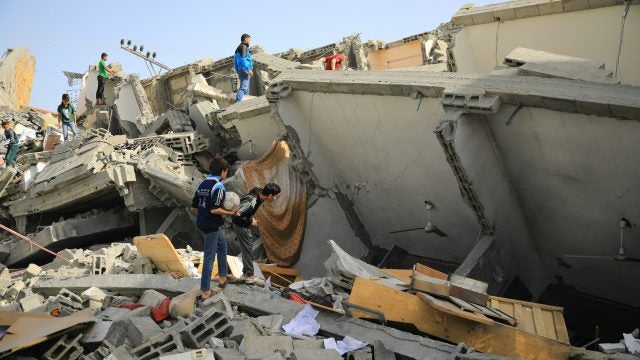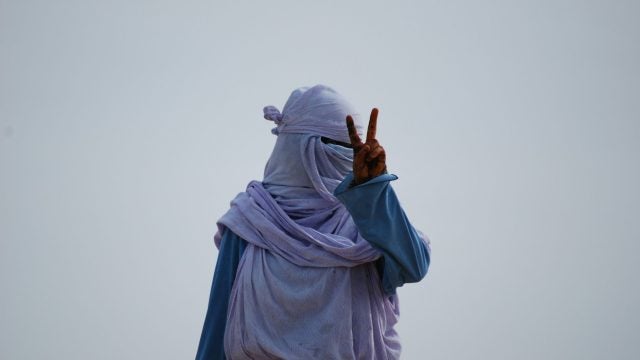Title: Mental Health and Psychosocial Support in Iraq: Challenges and Solutions
Worldwide, millions of people survive severely distressing experiences caused by war and conflict, humanitarian disasters, and displacement. While such events affect the mental health of any population, the psychosocial well-being of persons in humanitarian contexts are rarely addressed in research. In Iraq, sustained and accelerated trauma is a reality, as the local population has endured years of prolonged violence and persecution. Iraq has undergone almost forty years of conflict, including authoritarianism, an eight-year Iran-Iraq war, two Gulf Wars, decades of economic sanctions, a civil war, and the recent occupation by the Islamic State of Iraq and Syria (ISIS).
Mental health concerns increase in countries affected by protracted conflict, as experiencing distressing and traumatic events caused by long-term violence can result in debilitating levels of reduced self-esteem, poor health, alcohol addiction and drug abuse, depression, feelings of insecurity, social withdrawal, self-harm, and suicide.[1] To this effect, nearly all people in Iraq are impacted by mental health and psychosocial challenges, either by way of challenges they themselves face, or through their interactions with friends, family, and neighbors struggling with such issues.
Many people live with these dire realities in Iraq, caught up in “a mental-health crisis unlike any in the world.” ISIS brought the latest wave of experiences that were detrimental to the mental health of the Iraqi population, including the kidnapping of young children, sexual violence, massacres, and other gruesome atrocities. The ISIS capture of Mosul led to one of the fastest displacements in recorded history when nearly 500,000 people escaped the city within two days. The ISIS insurgency also demolished Iraq’s infrastructure, leaving millions of Iraqis unemployed, further accelerating mental health issues and needs.
To integrate sustainable mental health and psychosocial support services into humanitarian response programming, the local context regarding mental health must first be understood. By examining the mental health and psychosocial context and challenges in Iraq, I developed concrete solutions to bring necessary, contextualized, and long-term mental health support to Iraqi communities. For my research, I travelled to Iraq and conducted over forty interviews focused on mental health and psychosocial support and well-being with humanitarian actors, government officials, and local communities.
Challenges to Mental Health and Psychosocial Support in Iraq
As the country moves beyond prolonged violence, Iraq needs a healthy population able to support reconstruction effectively. Therefore, tackling the mental health and psychosocial support (MHPSS) needs across the country is a vital step towards Iraq’s recovery, as only a population with a strong mental and psychosocial well-being can work to build peace. With robust mental health and psychosocial well-being, Iraqis will be able to build peace within their own communities. Still, challenges to MHPSS service provision remain.
Challenge #1: Skills Shortage
To undertake this study, I held over forty interviews with government officials and humanitarian professionals providing MHPSS in Iraq, which exposed that the country currently lacks sufficient well-trained local clinical psychologists, psychiatrists, and other mental health care providers. Iraq’s recent history of repression and conflict has diminished basic MHPSS services and the institutional capacity to care for those facing mental and psychosocial challenges. Due to the lack of local MHPSS specialists, capacity-building across the nation’s health care system has fallen to humanitarian agencies. At the community level, specialized actors work to empower health care professionals to integrate MHPSS into primary care by assisting them in understanding MHPSS concepts and providing on-the-job supervision. Such training, however, remains limited due to a lack of long-term on-the-job supervision required to ensure sustainable capacity building. There is a high demand for local skilled MHPSS professionals who can ensure sustainable mental health services across Iraq. However, Iraq has a shortage of such professionals, as no Iraqi universities have ever offered clinical psychology degrees. There are, however, present-day efforts to build MHPSS training and awareness at the university level. For example, Duhok University provides clinical training for psychologists, and since 2016, has offered Iraq’s only degree in psychotherapy.
Challenge #2: Stigma
The high stigma associated with mental health and psychosocial concerns is also a significant challenge for MHPSS in Iraq. Social stigma often prevents people affected by mental health issues to seek services, and those who wish to access mental health care face cultural stigma. A 2010 study conducted on mental health perceptions in Iraq found that large proportions of the population hold stigmatizing attitudes towards people with mental illness. Interviews with mental health actors and the local community show that such stigma remains prevalent in Iraq, due to the substantive lack of mental health awareness and understanding at national and local levels. One prominent example mentioned by an MHPSS professional was that young men kidnapped by ISIS who face severe trauma are afraid of accessing support, as their trauma remains deeply stigmatized.
While stigmatization remains high among decision-makers, according to Lia Pastorelli who works on MHPSS in Iraq with the NGO Un Pone Per, trends highlight that affected persons are beginning to feel more comfortable in speaking out about mental health needs. This is reflected in Un Ponte Per’s programming which over the years has seen an increase in participants. Despite initially being apprehensive due to the stigma associated with seeking mental health assistance, more people across Iraq have accessed mental health support over recent years.
Challenge #3: Lack of MHPSS awareness
Conversations with MHPSS experts in Iraq confirm that the substantive lack of MHPSS awareness at national and local levels challenge MHPSS service provision across Iraq, emphasizing the need for increased public education and awareness of MHPSS. Awareness campaigns are essential to help the population understand the concept of mental health and the value of mental health care. Presently, various actors provide awareness-raising sessions as part of their programming, which must be sustained to ensure a long-term culture of understanding of MHPSS.
Despite giving short shrift to mental health needs in recent decades, the Iraqi government recently established a national plan for mental health, which aims to develop and implement strategies to promote MHPSS services. However, the government has only partially implemented the plans’ objectives, as according to Iraq’s National Director of Primary Mental Health Dr. Riyadh Al Ruadini funds allocated for mental health initiatives remain low. While there are ongoing efforts to incorporate MHPSS into primary health care centers and other health sectors, Dr. Al Ruadini states that challenges involving sustained government attention, funding, staffing, and local adherence to policy pose threats to the long-term success of the implementation of the national plan to address mental health. Due to the current absence of serious political will to improve the MHPSS response in Iraq, more awareness-raising is required to ensure that the government’s formulated plans are followed by concrete steps regarding actual implementation and execution.
Solutions to Ensuring Sustainable MHPSS in Iraq
Increased and long-term investments from the government and support from the international community are crucial to delivering long-term MHPSS services in Iraq, with the goal being that international MHPSS actors hand over operations to local organizations and authorities. Hence, current humanitarian programming should aim to co-create and strengthen lasting structures in Iraq which can outlast MHPSS programs implemented by external actors. Given the long-term nature of its needs, MHPSS in Iraq must go beyond short-term humanitarian assistance. According to MHPSS experts, “coordination and close collaboration among a variety of actors as well as buy-in at the political and community levels are major success factors with regard to long-term and high-quality psychosocial support.” MHPSS programming and services in Iraq can be strengthened by the following actions:
- Integration of MHPSS approaches into other humanitarian or development programming, such as livelihoods
- Increased evidence-based and localized MHPSS programming
- Contextualized MHPSS capacity-building over sufficient periods of time
- Mass awareness and advocacy campaigns for MHPSS at all levels
- Community education that addresses stigmatization
- Improved engagement and cooperation between actors (I/NGOs, UN, MoH, DoH)
- Development of a contextualized academic curricula in psychology at Iraqi universities
These recommendations can bring more contextualized and sustainable mental health support to communities across Iraq.
Concluding Thoughts
In regions such as Iraq, where the mental health of an entire population is impacted by conflict and crisis, access to MHPSS services is critical. Mental health well-being is essential at every stage of life, and it is the responsibility of all humanitarian and development actors to promote the mental and psychosocial well-being of the populations they serve. To ensure sustainable MHPSS in Iraq, cooperation among international and local humanitarian actors and the Iraqi government must be safeguarded and strengthened, as such collaboration will enable the MHPSS response to be handed to the government when the time is right, ensuring crucial long-term MHPSS access for the population.
[1] Meier, Julie. “Assessment of Mental Health and Psychosocial Needs and Recommendations to Support Returnees in Iraq’s Ninewa Governorate.” Oct. 2019.
. . .
Julie Meier is the founder of Refugee Pathways and a graduate of New York University’s Center for Global Affairs. She is a humanitarian aid worker having worked on the humanitarian responses to Syria, Iraq and Greece. Julie has been focusing much of her research on increasing context-specific and sustainable mental health support in humanitarian crises. Follow @JulieAnneMeier on Twitter.
Recommended Articles

This piece examines the UK government’s proscription of Palestine Action under the Terrorism Act, situating it within a broader trend of shrinking space for public dissent. It argues that the…

This article analyses the distortions of the International Humanitarian Law (IHL) notion of proportionality in the context of the Israel-Gaza war. It discusses Israel’s attempts to reinterpret proportionality to justify…

The escalating women’s rights crisis in Afghanistan demonstrates a gap in international legal protections of the rights of women and girls. The international community should fill this gap by making…